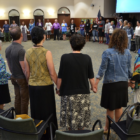
New book by an author who journeyed from incarcerated juvenile to college professor teaching restorative justice
|
Felix Rosado recently joined the Chestnut Hill College community as an inspiring and unconventional adjunct professor. Just two years ago he was serving a sentence of death by incarceration -- more commonly known as life without parole. He was freed via governor clemency after 27 years. Students say the class takeaways are improvements in their personal and professional lives -- worth the class time.


